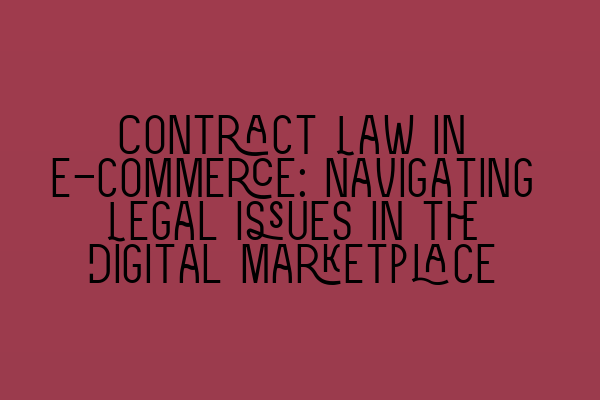Contract Law in E-commerce: Navigating Legal Issues in the Digital Marketplace
In today’s digital age, e-commerce has revolutionized the way business is conducted. With just a few clicks, consumers can purchase products and services from the comfort of their own homes. However, with this convenience comes a whole host of legal issues that both businesses and consumers must navigate. In this article, we will explore some of the key legal considerations in contract law for e-commerce transactions.
1. Offer and Acceptance
One of the fundamental principles of contract law is the concept of offer and acceptance. In e-commerce, this can be slightly more complex than in traditional offline transactions. The offer is typically made when a product or service is listed on a website, and acceptance occurs when the consumer completes the checkout process.
To ensure a valid contract, it is crucial for businesses to clearly outline their terms and conditions, including any disclaimers or limitations of liability. Consumers should also be aware of their rights and responsibilities when making online purchases. This includes reading and understanding the terms and conditions before agreeing to them.
2. Electronic Agreements
In e-commerce, contracts are often formed electronically, without the parties signing a physical document. Electronic agreements are generally enforceable under the law, provided that certain requirements are met. These requirements may vary depending on the jurisdiction, so it is important for businesses to stay updated with the applicable legal framework.
To enhance the validity and enforceability of electronic agreements, businesses can implement measures such as clickwrap agreements or terms of service that require users to actively agree to be bound by the terms. This helps to establish a clear intention to be bound by the contract.
3. Consideration and Payment
Consideration refers to something of value exchanged between the parties to a contract. In e-commerce, consideration is often monetary, with consumers providing payment in exchange for goods or services. It is important for businesses to have secure payment systems in place to protect consumers’ financial information and ensure the integrity of the transaction.
Businesses should also be aware of any additional legal requirements related to online payments, such as compliance with data protection regulations or anti-money laundering laws. By maintaining compliance, businesses can build trust with their customers and reduce the risk of legal disputes.
4. Consumer Protection
Consumer protection is a critical aspect of contract law in e-commerce. Many jurisdictions have laws in place to safeguard consumers’ rights when purchasing goods or services online. These laws may include provisions related to refunds, product warranties, and unfair contract terms.
To ensure compliance with consumer protection regulations, businesses should clearly communicate information about their products or services, including any limitations or restrictions. This can help to minimize the risk of misleading or deceptive conduct and protect businesses from potential legal liabilities.
5. Dispute Resolution
Disputes can arise in any contractual relationship, and e-commerce transactions are no exception. To effectively resolve disputes, businesses can implement alternative dispute resolution mechanisms such as mediation or arbitration. These methods can often be quicker and less costly than traditional litigation.
Including a dispute resolution clause in e-commerce contracts can provide clarity and predictability for both parties. It is important to clearly outline the chosen method of dispute resolution and any applicable rules or procedures.
Conclusion
Contract law in e-commerce is a complex and ever-evolving area of law. By understanding and addressing the legal considerations outlined in this article, businesses can navigate the digital marketplace more effectively and mitigate potential legal risks. Consumers, on the other hand, can make informed decisions and protect their rights when engaging in online transactions.
For further resources on legal topics related to the Solicitors Qualifying Examination (SQE), check out these articles:
– SQE 1 Practice Exam Questions
– SQE 1 Practice Mocks FLK1 FLK2
– SQE 2 Preparation Courses
– SQE 1 Preparation Courses
– SRA SQE Exam Dates
By staying informed and seeking professional advice when needed, businesses and consumers can thrive in the digital marketplace while ensuring compliance with the law.
